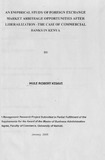| dc.description.abstract | Since independence, Kenya maintained restriction on foreign exchange currency
transaction including amount of foreign currency that could be purchased. In 1995,
Kenya repealed the Exchange Control Act, an important feature in the liberalization of
trade and foreign exchange regimes. This paved way for a legalization of the hitherto '~
non-existent market" into the commercial banks foreign exchange market.
This paper looks at the existence of arbitrage opportunities of commercial banks foreign
exchange market in Kenya.
The intention is to ascertain whether information is widely and cheaply available to the
market participants. Secondary data was obtained from commercial banks under study
and analyzed using chi-square distribution, F-distribution and line graphs. The results
obtained are analyzed in this report. The paper mainly found that the foreign exchange
market is generally inefficient as evidenced by the number of arbitrage opportunities that
exist. However, possible benefits to Kenya from the liberalization of the foreign
exchange market included increased availability DC foreign currency and reduced
inconveniences, which foreign currency buyers formerly experienced in the previous
control regime. The most important development is the increased level of economic
activity in the country due to easy access to foreign currency.
A key indicator of financial performance and efficiency-cy is the spread between the selling
and buying rates. If this spread is large, indicates the existence of arbitrage
'opportunities. This is because it encourages speculators to buy currencies cheaply and
sell them dearly. But in Kenya. foreign exchange liberalization seems to have led to a
widening foreign exchange rate spread. | en |

